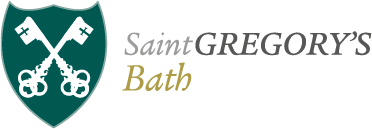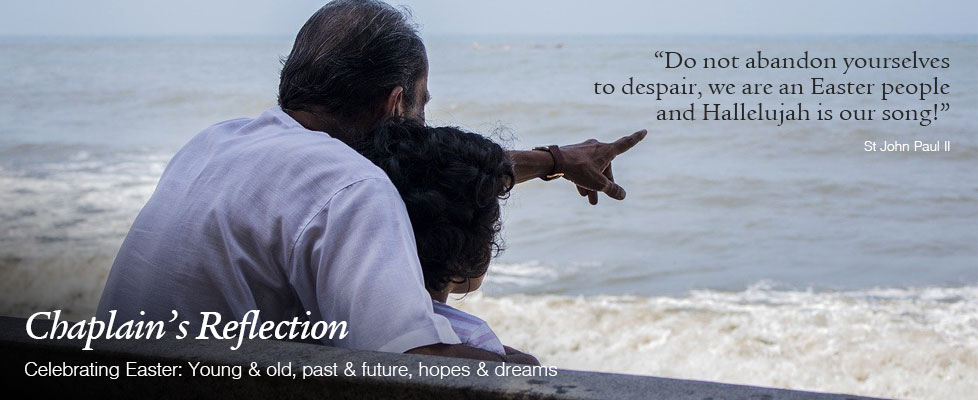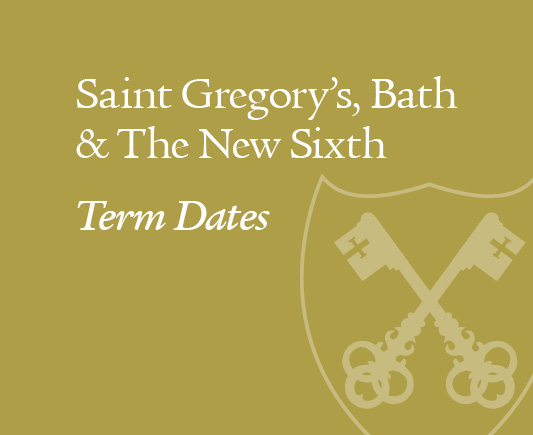Celebrating Easter: Young & old, past & future, hopes & dreams
In October of 2018, when Pope Francis gathered the Bishops of the world to the Vatican for a synod (essentially an important meeting to clarify/decide on important issues of doctrine, etc of our faith) he chose as the topic‘Young people, faith and vocational discernment’. In preparation for the synod young people all around the world were asked their opinions and thoughts on the direction of the Church and their role within her. Representative young people were then invited to be a part of the synod itself. Stories subsequently came out and spoke of Pope Francis engaging with young people on all manner of difficult and challenging subjects in an open and honest way. Of him rearranging the seating to ensure young people were at the front of the auditorium and more. Months later the Pope released a document, an apostolic exhortation, that incorporated all the feedback, conversations, opinions and voices into one joyful letter – Christus Vivit (Christ is Alive).
The reason I want to focus on this is because one particular chapter is entitled ‘Young People With Roots’ and hones in on the heart of young people, their roots, their family, their past and future, with subheadings of ‘Your relationship with the elderly, dreams and visions, taking risks together’. The reflections and thoughts shared with us from Pope Francis are so beautifully poignant and appropriate in this season of Easter with it’s promise of joy, hope and love, as well as in the context of recent news stories and life experiences.
YOUR RELATIONSHIP WITH THE ELDERLY
187. At the synod, we heard that “the young are focused on the future and they face life with energy and dynamism. But they are also tempted…to give little attention to the memory of the past from which they come, in particular the many gifts to them by their parents, their grandparents and the cultural experience of the society in which they live. Helping the young to discover the living richness of the past, to treasure its memory and to make use of it for their choices and opportunities, is a genuine act of love towards them, for the sake of their growth and the decisions they are called to make.”
I’d almost summarise the start of this passage as the battle between the free will of young people with the lessons and directions we parents are trying to point them in. How do we strike the balance of encouraging dynamism that will inevitably encounter pain and mistakes, with “We’re older and know best”? The latter section of this paragraph alludes to ‘living richness’ – maybe there are so many more ways we can open up the world by helping young people encounter the living richness of more relationships, experiences and memories?
188. The word of God encourages us to remain close to the elderly, so that we can benefit from their experience: “Stand in the assembly of the elders. Who is wise? Cling to him…If you see an intelligent man, visit him; let your foot wear out his doorstep.” (Sirach 6:34,36). In every case, the long years they lived and all they experienced in life should make us look to them with respect:…“For the glory of young men is their strength, but the beauty of old men is their grey hair.” (Proverbs 20:29).
A couple of weeks ago when the Queen broadcast her speech to the nation a couple of things really struck me. The first was that she didn’t once mention Corona Virus or Covid-19, it went unspoken. But the one that really got me was towards the end, when she deviated slightly from the slightly generic but rousing script by speaking about the time she and her sister broadcast live to children from Windsor Castle in 1940. The Queen was recalling the time when separation and anxiety from evacuation was a struggle for young people, was no doubt scary and heart breaking. I felt like we got a fleeting glimpse of the experience that Her Majesty can bring to us, and can equally be brought to us by all the elderly.
191. The world has never benefited, nor will it ever benefit, from a rupture between generations. That is the siren song of a future without roots and origins. It is the lie that would have you believe that only what is new is good and beautiful. When intergenerational relationships exist, a collective memory is present in communities ,as each generation takes up the teachings of its predecessors and in turn bequeaths a legacy to its successors. In this way, they provide frames of reference for firmly establishing a new society. As the old saying goes: “If the young had knowledge and the old strength, there would be nothing they could not accomplish.”.
I truly believe that the lived experience that every person, young and old, is a part of during this pandemic is benefitting relationships between generations. The number of volunteer responders, the encouragement from children with their rainbows, the care and concern being shown from one generation to another. They are all symptomatic of a society growing closer together, or at least becoming more open about a shared past, present and future. I wonder how much more we will gather for family meals after this is all over, how often young people will visit grandparents – will there be an increase? Can we as adults, and our young people can a more concerted effort to teach the power of technology to older generations, sharing our knowledge, to receive their strength of character more regularly?
DREAMS AND VISIONS
193. The elderly have dreams built up of memories and images that bear the mark of their long experience. If young people sink roots in those dreams, they can peer into the future; they can have visions that broaden their horizons and show them new paths. But if the elderly do not dream, young people lose clear sight of the horizon.
195. That is why it is a good thing to let older people tell their long stories, which sometimes seem legendary or fanciful – they are the dreams of old people – yet are often full of rich experiences, of eloquent symbols, of hidden messages. These stories take time to tell, and we should be prepared to listen patiently and let them sink in, even though they are much longer than what we are used to in social media. We have to realise that the wisdom needed for life bursts the confines of our present day media resources.
I can’t help but think of Only Fools and Horses after reading this section and the running joke of Uncle Albert’s “during the war” stories which instantly drew yawns, excuses and ridicule from his nephews and others. In David Jason’s autobiography he speaks about the pain the cast felt at the death of Lennard Pearce who played Grandad. They didn’t feel it was appropriate to replace him and had no plans for an Uncle Albert character. Yet Buster Merryfield, an unknown with no serious acting experience, contacted the show directly and asked to audition. Jason talks about how he struggled at first but soon shone and became loved by everyone on set. Now it’s impossible to imagine the show without Uncle Albert with his long winded tales littered with hidden wisdom. So too, it seems Pope Francis, a man in his 80’s has hit the nail on the head with this point about there being no need to confine wisdom, dreams and messages into the capacities of social media. Instagram, Snapchat and Facebook encourage short statements, preferably images, even anonymity. Twitter had to be pushed for years to change their character limit for posts from 140 to 280. There’s truly something to be said for the Pope’s observation and guidance here.
TAKING RISKS TOGETHER
201. During the synod, one of the young auditors from the Samoan Islands spoke of the Church as a canoe, in which the elderly help to keep on course by judging the position of the stars, while the young keep rowing, imagining what waits for them ahead. Let us steer clear of young people who think that adults represent a meaningless past, and those adults who always think they know how young people should act. Instead, let us all climb aboard the same canoe and together seek a better world, with the constantly renewed momentum of the Holy Spirit.
Easter is a new beginning for all humanity, a redemptive action for all of Christ’s flock to discover anew the part each of us has in God’s world. Our age, our past, our gender or race have no effect on the momentum of the Holy Spirit; only our willingness to allow the Holy Spirit in is important. I love this metaphor of the canoe, why not share it with others and see what they think or where they fit into the vessel.
Mr M Robinson
Lay Chaplain




